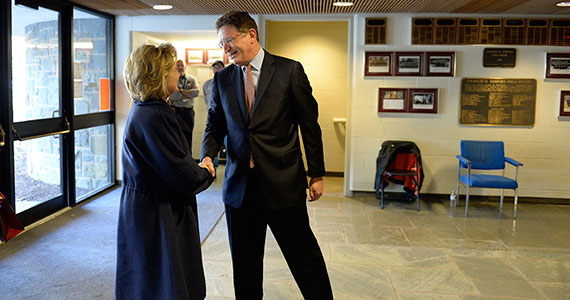Former Secretary of State Hillary Rodham Clinton delivered the latest lecture in the Kerschner Family Series Global Leaders at Colgate tonight in Sanford Field House. More than 5,000 students, parents, alumni, and friends attended the event, which is the highlight of Family Weekend.
It was a warm welcome-back for Clinton, who first visited the university in 2004 to help launch the Upstate Institute. “I couldn’t let 2013 go into the history books without visiting Colgate,” she said. “After all, this is probably the only place in the country where 13 is actually a lucky number.”
Of the university’s 13 founders, Clinton said, “they must have done something right, because Colgate has become one of the most dynamic centers of higher learning in our nation.”

Colgate President Jeffrey Herbst greets Hillary Rodham Clinton just before her address at Sanford Field House. (Photo by Andy Daddio)
Colgate’s role as a regional and international leader served as a springboard for Clinton’s defense of American leadership in general. In an age when many question the country’s ability to maintain its stature on the world stage, Clinton took a different view:
“With all the challenges we face at home and abroad, our country is well-positioned to rise to any of them,” she said. “Even after a long decade of war and financial crisis, America is still the indispensable nation.”
Clinton argued that proof lies in the very changes that are causing a reevaluation of America’s status. Each one — including the rise of China as a global power, democracy movements in the Middle East, and recent shifts in energy production — favor America’s strength for creativity and relationship-building.
“We will have to lead in new ways if we want to maintain our role in the world,” she said, “but the shifting global landscape makes American leadership more necessary, not less.”

Colgate President Jeffrey Herbst introduces Hillary Rodham Clinton to a huge crowd at Sanford Field House. (Photo by Andy Daddio)
She further noted that the United States must also become a nation of ideas again. It must leave behind the partisan politics that recently shut down government and threatened financial default. “It’s not only how that makes us feel here at home,” she said. “The entire world watches.”
Teacher Jane Kunzman, whose husband, Steve ’77, and daughter Molly ’12 attended the lecture with her, said Clinton’s comments about citizenship especially resonated with her. It was a message she would bring back to her students at a New Jersey school.
“I liked what she said about being problem-solvers, how we can prepare for the future by tapping into the creativity and innovation of our young people,” Kunzman said.
After her address, Clinton fielded questions from Colgate President Jeffrey Herbst. The conversation moved from the Congo to Syria, foreign surveillance to cyberwarfare. Of the government shutdown, Clinton pointed out that President Barack Obama followed the same course as her husband when dealing with a hostile opposition. “No president can give in to that kind of threatening behavior,” she said.
Clinton’s exchange with Herbst was her second Q&A of the evening. Before her speech, she met with several dozen students to answer their questions about an array of issues. Led by Provost and Dean of the Faculty Douglas Hicks, undergraduates rose to ask questions about drone strikes in Pakistan, the 2016 primary race, the Clinton Foundation, hydrofracking, and simply being a woman in a professional environment that is dominated by men.
“It’s memorable and it’s inspirational,” said Maxine Kerschner P’07’09, whose leadership support named the Global Leaders program. “Thanks to this series, a new generation of diplomats, policymakers, and activists can meet and draw energy from those who are shaping the geopolitical landscape.”
CNN, The Daily Beast, and several local news organizations were on hand to cover Clinton’s address, which still can be viewed here. The media’s presence on campus further demonstrated the reach of the Global Leaders series.
Launched in 2007 and sponsored by Colgate’s Parents’ and Grandparents’ Fund, it has brought a number of influential speakers to campus, including President Bill Clinton; Tony Blair, former prime minister of Great Britain; Felipe Calderón, former president of Mexico; and the Dalai Lama, spiritual leader of Tibetan Buddhism.
“Is it so odd to think that a sitting president might shake the hand of a future president at an event like this?” Kerschner asked the audience. “Our guest tonight can confirm that stranger things have happened.”